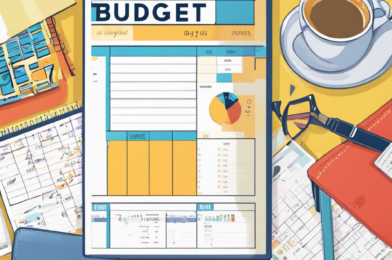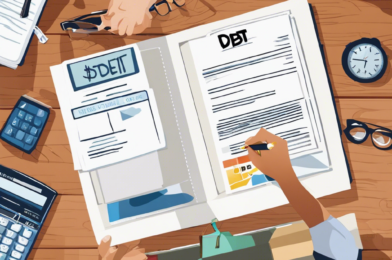Setting financial goals is an important step towards achieving financial security and freedom. While it may seem daunting at first, defining clear objectives and creating a plan to reach them can be a rewarding journey. So, how can you set meaningful financial milestones and successfully attain them?
Firstly, it’s crucial to be specific and clear about what you want to achieve. Instead of simply saying, “I want to save more money,” define exactly how much you aim to save and for what purpose. Are you saving for a dream house, your child’s education, or perhaps an early retirement? Clear and precise targets provide a sense of direction and motivate you to stay on course.
Breaking down your primary goal into smaller, manageable milestones is the next step. Setting short-term objectives that lead to your long-term ambition helps you stay motivated and makes the overall goal seem more attainable. For instance, if your long-term goal is to purchase a house, short-term goals could include saving for a down payment, improving your credit score, or reducing existing debt. This way, you can celebrate small victories along the way, providing a sense of accomplishment that fuels your journey.
Regularly reviewing and adjusting your financial targets is essential to staying on track. Life is full of surprises, and your plans should be flexible enough to accommodate unexpected expenses or changes in your situation. Review your goals and progress at least quarterly and make adjustments as necessary. This might include increasing your savings rate, cutting back on non-essential expenses, or exploring new income streams to accelerate your progress.
Seeking expert advice can be invaluable on your path to financial success. Consider consulting a financial advisor or accountant, especially for complex matters like investments, taxes, or estate planning. These professionals can provide tailored guidance based on your unique circumstances and help you navigate the often complex world of personal finance. They can also hold you accountable and provide valuable insights to ensure you’re making informed decisions.
Education is empowering, so take the time to learn about personal finance. Read books, follow reputable financial websites and podcasts, and join online communities or forums where you can ask questions and share experiences. The more you understand topics like budgeting, investing, and debt management, the more confident you’ll be in making financial decisions. This knowledge will enable you to make the most of your money and work towards your aspirations effectively.
Achieving financial goals requires discipline and commitment, but it’s certainly achievable with the right strategies and mindset. By setting clear and specific targets, breaking them down into manageable steps, regularly reviewing your progress, seeking expert guidance, and educating yourself, you’ll be well on your way to financial success and security. Remember, the journey to financial freedom is a marathon, not a sprint, and every small step counts.
Now that we’ve emphasized the importance of setting clear and specific financial aspirations, let’s delve into the practical strategies that will empower you to attain them. First and foremost, creating a budget and sticking to it is non-negotiable. A budget is essentially a plan that outlines how you intend to allocate your income to various expenses and savings goals. It helps you stay mindful of your spending and ensures your hard-earned money goes where you want it to.
Start by listing your after-tax income, then jot down your essential expenses, such as rent or mortgage, utilities, groceries, and transportation. Don’t forget to include savings as a fixed expense to prioritize them. Calculate the difference between your income and essential expenses to determine how much you can allocate to discretionary spending, like entertainment or dining out. There are numerous budgeting apps and spreadsheets available to make this process easier and help you stay organized.
Once you have a budget in place, the next step is to find ways to cut back on unnecessary spending. Examine your expenses and identify areas where you can reduce costs without compromising your quality of life. For example, you might opt for cooking at home instead of dining out frequently or switch to a more affordable internet or phone plan. Finding less expensive alternatives or simply cutting back on non-essential expenditures can free up more money to put towards your monetary goals.
While budgeting and saving are crucial, increasing your income can significantly accelerate your journey to financial success. Consider taking on a side hustle or freelance work to boost your earnings. This could be anything from driving for a ride-sharing service to tutoring, consulting, or selling handmade crafts online. Not only will this extra income help you achieve your short-term objectives faster, but it can also open up opportunities for longer-term investments or ventures.
Investing is a powerful tool to make your money work for you, and it’s not just for the wealthy. Thanks to a variety of investment platforms and robo-advisors, anyone can start investing with small amounts. Educate yourself about the stock market, mutual funds, and other investment vehicles to make informed decisions. Diversifying your investments across different asset classes and industries can help manage risk while potentially generating substantial returns over time.
Lastly, as you strive towards your financial ambitions, it’s essential to celebrate your accomplishments along the way. Reaching a savings milestone, paying off debt, or achieving a short-term goal are all reasons to pat yourself on the back. Rewarding yourself for these achievements keeps you motivated and reinforces the positive behaviors that lead to financial success. Just be mindful to balance celebrations with your overall monetary targets so you don’t undo your hard work.
In summary, achieving financial goals requires a combination of discipline, planning, and strategic action. By creating a budget and sticking to it, reducing unnecessary spending, boosting your income, and investing wisely, you’ll be well on your way to financial freedom. Remember to celebrate the small wins and always seek opportunities to learn and improve. Financial success is a journey, and with the right mindset and tools, you can reach destinations you once thought unimaginable.










